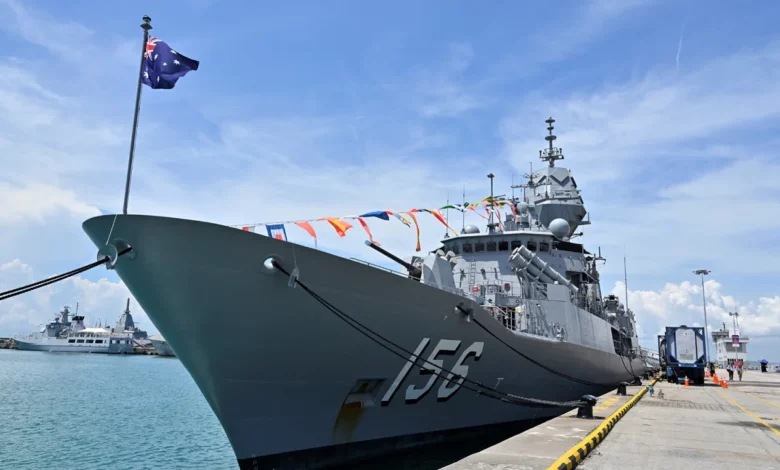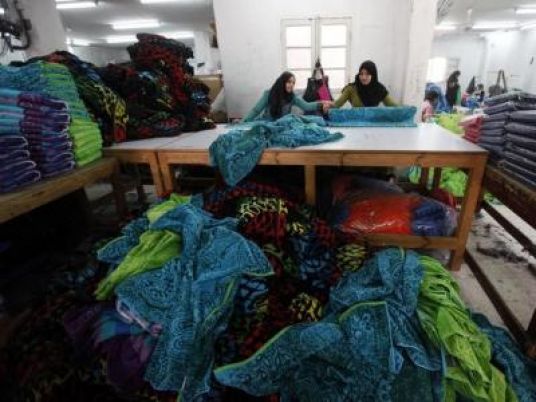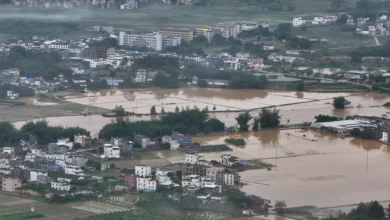
Australia’s prime minister has accused the Chinese navy of “dangerous, unsafe and unprofessional” conduct after an incident in international waters near Japan, marking a potential friction point with Beijing weeks after he visited the Chinese capital to stabilize relations.
Australian divers aboard the long-range frigate HMAS Toowoomba were trying to clear fishing nets from its propellers on November 14 when a Chinese destroyer approached, Australia’s Defense Minister Richard Marles said in a statement Saturday.
Despite being warned that a diving operation was underway, the Chinese destroyer operated its sonar in a manner that “posed a risk to the safety of the Australian divers who were forced to exit the water,” the statement said.
Medical assessments found the divers had sustained minor injuries, the statement added.
In an interview with CNN affiliate Sky News Monday, Australian Prime Minister Anthony Albanese said he was “very concerned” by the incident, adding that “one person suffered an injury as a result of the actions of China.”
Albanese refused to confirm whether he raised the incident with Chinese leader Xi Jinping when they met at the APEC summit in San Fransisco last Thursday.
“I can assure you that we raised these issues in the appropriate way and very clearly, unequivocally. And China, there’s no misunderstanding as to Australia’s view on this,” he said.
China’s Defense Ministry on Monday dismissed Australia’s accusations as “completely inconsistent with the facts.”
Wu Qian, a ministry spokesperson, said the Chinese destroyer, Ningbo, had been tracking and monitoring the Australian frigate in accordance with international laws and regulations.
“The Chinese ship maintained a safe distance from the Australian ship and didn’t engage in any activities that might affect the Australian diving operations,” Wu said in a statement.
“We urge Australia to respect the facts, stop making reckless and irresponsible accusations against China, and do more things that are conducive to enhancing the accumulation of mutual trust between two sides.”
Asked about the incident at a regular news briefing on Monday, China’s Foreign Ministry spokesperson Mao Ning said: “We hope relevant parties can stop causing troubles at China’s doorstep and work with China to jointly safeguard the momentum of improving China-Australia relations.”
The incident took place a week after Albanese paid a landmark visit to Beijing – the first trip by an Australian leader in seven years – to stabilize rocky bilateral ties after years of economic tension.
In the Sky News interview, Albanese sidestepped a question on whether the incident will make bilateral relations “look shaky” now.
“Well, what I said when I was in China is that we will cooperate where we can but disagree where we must. And this is one of those times where we disagree with the action of China,” Albanese said.
“We’ve made it clear that we disagree with what occurred, that we have the strongest possible objection, and that this sort of event should not occur.”
‘Unsafe and unprofessional’ interaction
In his statement Saturday, Marles said the Australian government had expressed “serious concerns” to the Chinese government over what it called an “unsafe and unprofessional” interaction with a People’s Liberation Army Navy (PLA Navy) destroyer.
Medical assessments found the divers had sustained minor injuries, “likely due to being subjected to the sonar pulses from the Chinese destroyer,” the statement said.
Military ships use sonar to detect and locate objects in the water. Divers exposed to high levels of underwater sound can suffer from “dizziness, hearing damage or other injuries to other sensitive organs,” depending on the frequency and intensity of the sound, according to the London-based Diving Medical Advisory Committee.
The HMAS Toowoomba had been in Japan’s exclusive economic zone conducting operations in support of United Nations sanctions enforcement and was enroute to commence a scheduled port visit to Japan, according to Marles’ statement.
“Australia expects all countries, including China, to operate their militaries in a professional and safe manner,” Marles said.
“Defense has for decades undertaken maritime surveillance activities in the region and does so in accordance with international law, exercising the right to freedom of navigation and overflight in international waters and airspace.”
China’s navy and air forces have been accused of unsafe practices by US and Canadian militaries in multiple close encounters in the East and South China seas in recent months.
Earlier this month, the Canadian military said a Chinese warplane fired flares in front of its helicopter over international waters of the South China Sea on October 29, an operation it said was reckless and could have resulted in the downing of the aircraft.
In response, China blamed Canada for carrying out “malicious and provocative” actions in the South China Sea.
Ray Powell, director of SeaLight at the Gordian Knot Center for National Security Innovation at Stanford University, said it will likely never be known if the order to use the sonar came from commanders in Beijing or at a lower level, maybe the Chinese destroyer captain himself.
“Either is disturbing, as the former would indicate mendacity at very senior levels, while the latter would demonstrate a mendacious military culture,” said Powell, a former US Air Force officer.
“Were the roles reversed, it seems clear to me that an Australian naval commander who did the same thing would be relieved of command, or worse. Yet nobody believes such action is even being considered by Beijing,” Powell said.
CNN’s Wayne Chang contributed reporting.




